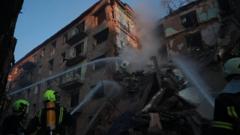In a significant escalation of the ongoing conflict, Israel conducted airstrikes on Tehran, focusing on military headquarters and a prison, prompting missile retaliations from Iran. With the U.S. joining the fray through targeted operations on nuclear sites, international calls for diplomacy and warnings of severe consequences arise, spotlighting the potential for wider regional instability.
Tensions Rise as Israel Strikes Tehran and Iran Prepares Retaliation

Tensions Rise as Israel Strikes Tehran and Iran Prepares Retaliation
Israel intensifies military actions against Iran amid escalating conflict, targeting key sites while Iran considers its response.
Israel has ramped up its military campaign against Tehran, targeting vital military infrastructure and a notorious prison in airstrikes launched on Monday. This latest offensive comes just a day after the United States conducted strikes on three Iranian nuclear sites, marking a significant escalation in the ongoing conflict between these nations. Reports indicate that the Israeli military aimed at sites believed to house operational command centers for the Revolutionary Guards, with the strikes prompting Iranian missile salvos that resulted in widespread air raid warnings throughout Israel.
The situation is rapidly evolving as Iran's government grapples with its options for retaliation. Iran's foreign minister, Abbas Araghchi, met with Russian President Vladimir Putin on the same day, signifying Tehran's search for allies amid rising tensions. While the U.S. has characterized its recent military actions as critical to diminishing Iran’s nuclear ambitions, concerns among global leaders about further escalation in the region are mounting.
The airstrikes have had immediate repercussions on both sides. Reports from Tehran indicate significant destruction, including damage to power lines in the capital, with a population of over a million experiencing outages. Iranian officials assert that retaliation is on the table, with warning signs that Iranian-backed militia forces are preparing to act against U.S. military bases in Iraq and Syria.
U.S. military officials confirmed the use of bombers carrying bunker-busting munitions targeting the Fordo nuclear facility, one of the most fortified sites in Iran's nuclear program. However, uncertainty surrounds the effectiveness of these strikes, as U.S. defense assessments suggest Iran may still possess the capability to expedite its nuclear ambitions despite the damage reported.
Amidst these developments, the International Atomic Energy Agency (IAEA) has called for urgent dialogue to avert disaster, highlighting that military attacks on nuclear facilities can have unimaginable consequences. The IAEA's director, Rafael Grossi, expressed concerns regarding the escalating violence and reiterated the necessity for diplomatic resolutions.
While international diplomatic channels remain a priority, the fear of further retaliation looms in the backdrop, with potential for the conflict to disrupt crucial global oil supplies, particularly through the Strait of Hormuz. As both Israel and Iran brace for the next moves in this volatile power struggle, global markets are already reflecting the economic impacts, with stocks dipping and oil prices climbing in response to the conflict.
With the situation unfolding, the international community awaits definitive actions from both the U.S. and Iran, hoping against a backdrop of rhetoric that reason will prevail over retaliation.























